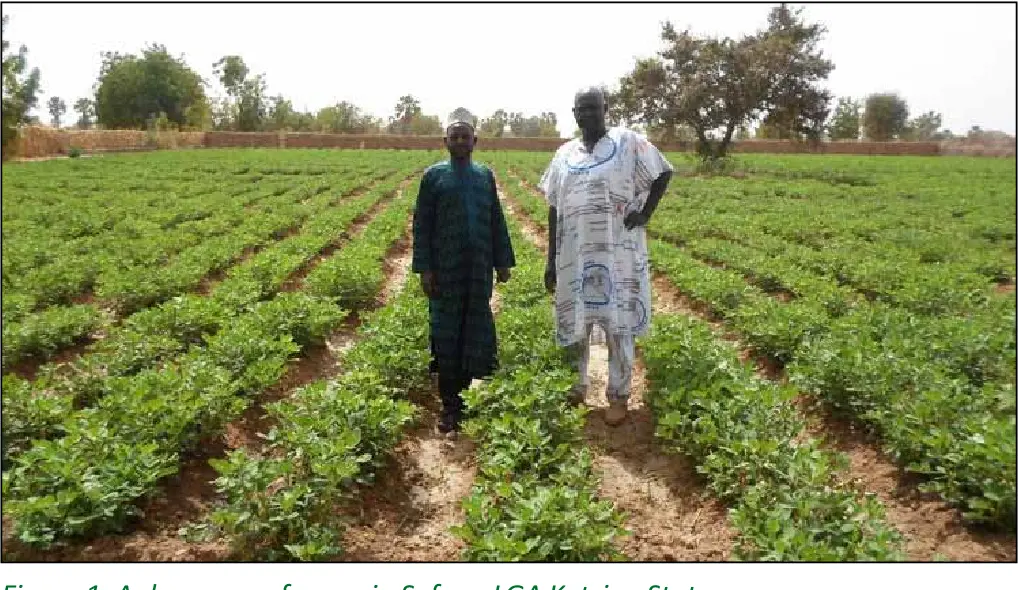-
-
Suite 1, Floor 2, Wing C, Alhaji Adenekan Plaza, Okota Road, Isolo, Lagos State, Nigeria
Blog Details

24
JulUnveiling the Profit Potential of Groundnut Farming in Nigeria
Unveiling the Profit Potential of Groundnut Farming in Nigeria
Contents
Groundnut farming in Nigeria holds immense profit potential, yet this aspect of agriculture remains underexplored by many. Nigeria, with its favorable climate and vast arable land, provides an ideal environment for cultivating groundnuts. This blog aims to unveil the profit potential of groundnut farming in Nigeria, exploring key aspects such as market demand, profitability analysis, and best practices for maximizing returns.
By delving into the intricacies of groundnut farming, we seek to empower farmers and investors to capitalize on this lucrative opportunity and contribute to the growth of Nigeria’s agricultural sector. Join us as we uncover the wealth hidden in the humble groundnut, showcasing its role as a cornerstone of agricultural profitability in Nigeria.
Factors Influencing Profitability:
Several factors contribute to the profitability of groundnut farming in Nigeria. These include the availability of suitable land, access to quality seeds and inputs, favorable weather conditions, efficient farming practices, and access to markets.
Suitable Land and Climate:
Suitable land and climate are pivotal factors influencing the profitability of groundnut farming in Nigeria. The soil must be well-drained sandy loam or sandy soil, facilitating easy penetration of the pegs and reducing the risk of waterlogging. The ideal pH level for groundnuts is between 6.0 and 7.0, ensuring optimal nutrient availability and plant health.
Groundnuts thrive in a warm climate, with temperatures ranging from 20°C to 30°C, and are sensitive to frost and waterlogging. Areas with a dry and warm climate, such as Nigeria’s northern regions like Kano and Kaduna, are ideal for cultivation. Adequate but well-distributed rainfall throughout the growing season is essential, making areas with a bimodal rainfall pattern, such as the savannah regions, favorable.
Altitudes below 1,200 meters above sea level are suitable for groundnut cultivation, as higher altitudes can affect flowering and pod development. Ample sunlight exposure is crucial for photosynthesis and pod development. Proper land preparation, including plowing, harrowing, and leveling, ensures good soil aeration and water infiltration.

Access to Quality Seeds and Inputs:
Access to quality seeds and inputs is critical for the profitability of groundnut farming in Nigeria. High-quality seeds are essential for achieving high yields and producing healthy plants resistant to pests and diseases. Additionally, access to fertilizers, pesticides, and herbicides helps farmers maintain crop health and productivity.
However, many farmers in Nigeria face challenges in accessing these inputs due to high costs, limited availability, and poor distribution networks. Improving access to quality seeds and inputs through government support, extension services, and private sector involvement can significantly enhance the profitability of groundnut farming in Nigeria.
Efficient Farming Practices:
Efficient farming practices play a crucial role in the profitability of groundnut farming in Nigeria. Practices such as timely planting, proper spacing, and adequate weed control can significantly increase yield. Conservation tillage techniques help retain soil moisture and reduce erosion, contributing to higher productivity.
Integrated pest and disease management strategies minimize crop losses and reduce the need for expensive chemical inputs. Proper irrigation and water management ensure optimal plant growth and development. Additionally, crop rotation and intercropping can improve soil fertility and reduce the risk of pest infestations. Adopting these efficient farming practices can enhance the profitability and sustainability of groundnut farming in Nigeria.
Market Access:
Market access is crucial for the profitability of groundnut farming in Nigeria. Farmers need reliable channels to sell their produce at fair prices. However, many face challenges such as poor infrastructure, limited market information, and middlemen exploiting the market.
Improving market access through better infrastructure, such as roads and storage facilities, can reduce post-harvest losses and ensure farmers get better prices. Additionally, providing market information and facilitating direct market linkages can help farmers negotiate better prices and improve their profitability. Access to markets that value quality and sustainability is essential for the long-term profitability of groundnut farming in Nigeria.
Profitability Analysis:
On average, a well-managed groundnut farm can yield profits ranging from N100,000 to N300,000 per hectare, making it a profitable venture for farmers.
Profitability analysis in groundnut farming in Nigeria involves various factors that influence the financial outcome of the venture. These factors include:
- Input Costs: The costs associated with acquiring seeds, fertilizers, pesticides, and other inputs impact profitability. Efficient management and sourcing of inputs can lower costs.
- Yield Potential: The expected yield per hectare is a key determinant of profitability. Factors such as soil quality, climate conditions, and farming practices affect yield.
- Market Prices: Fluctuations in market prices for groundnuts can significantly impact profitability. Access to markets with favorable prices is crucial.
- Operational Expenses: Costs related to labor, machinery, irrigation, and other operational aspects influence profitability. Efficient use of resources is essential.
- Government Policies: Government policies related to agriculture, such as subsidies, taxes, and regulations, can impact profitability.
- Risk Management: Factors such as weather risks, pest and disease outbreaks, and market uncertainties affect profitability. Implementing risk management strategies is important.
- Economic Conditions: Overall economic conditions, including inflation rates and exchange rates, can impact input costs and market prices, thereby influencing profitability.
- Technology Adoption: The adoption of modern farming technologies and practices can increase efficiency and yield, improving profitability.
- Access to Finance: The availability of finance for investment in inputs and equipment can affect profitability. Access to credit and financial services is important.
Analyzing these factors can help groundnut farmers in Nigeria make informed decisions to enhance profitability and ensure the sustainability of their farming operations.
Conclusion:
Groundnut farming in Nigeria remains a profitable venture for farmers, thanks to the country’s favorable agro-climatic conditions and growing demand for groundnuts. By adopting efficient farming practices, accessing quality inputs, and securing reliable markets, farmers can maximize their profits and contribute to Nigeria’s agricultural development.
Author's Details
gombella
Other posts by gombella